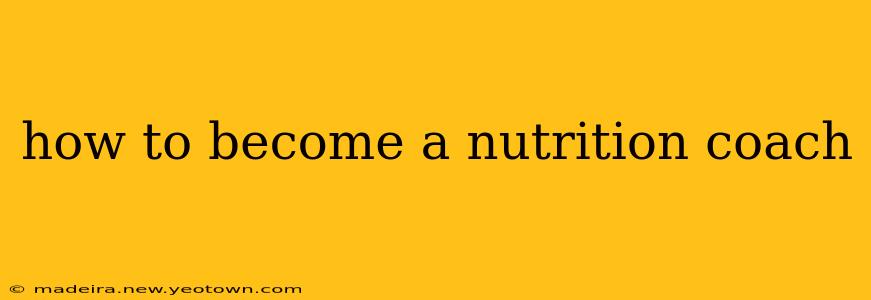How to Become a Nutrition Coach: A Journey to Empowering Others
The path to becoming a nutrition coach is a rewarding one, filled with the satisfaction of helping others achieve their health goals. But it's not a quick sprint; it's a marathon requiring dedication, knowledge, and a genuine passion for helping people. This journey involves several key steps, each crucial in building a successful and ethical coaching practice. Let's embark on this exploration together.
What Education and Certifications Do I Need to Become a Nutrition Coach?
This is often the first question aspiring coaches ask. The answer isn't as straightforward as a single required degree. The field is diverse, and several paths lead to success. While a degree in nutrition science, dietetics, or a related field provides a strong foundation, it's not strictly mandatory. Many successful coaches opt for specialized certifications instead. These certifications vary widely in their rigor and focus. Some popular options include certifications from the International Sports Sciences Association (ISSA), the National Academy of Sports Medicine (NASM), and the American College of Sports Medicine (ACSM). These programs cover essential topics like macronutrient balancing, micronutrient needs, meal planning, and understanding different dietary approaches. Research different programs carefully to find one that aligns with your learning style and career goals. Look for programs accredited by reputable organizations.
What are the Different Types of Nutrition Coaching?
The world of nutrition coaching isn't monolithic. The type of coaching you choose often depends on your interests and target audience.
- General Wellness Coaching: This focuses on improving overall health and well-being through dietary changes and lifestyle adjustments. It's a great starting point for those new to the field.
- Sports Nutrition Coaching: This specialization focuses on optimizing nutrition for athletes to enhance performance and recovery. It requires a deeper understanding of exercise physiology and sports-specific nutritional needs.
- Weight Management Coaching: This focuses on helping clients achieve healthy weight loss or gain through tailored nutrition plans and behavioral strategies. It's crucial to approach this area ethically, avoiding fad diets and promoting sustainable lifestyle changes.
- Plant-Based Nutrition Coaching: With the increasing popularity of plant-based diets, this specialization is gaining significant traction. It requires in-depth knowledge of plant-based nutrition and how to ensure clients meet their micronutrient needs.
Choosing your niche allows for focused expertise and targeted marketing.
How Much Does it Cost to Become a Certified Nutrition Coach?
The cost varies greatly depending on the certification program you choose and the level of education you pursue. Expect to invest anywhere from a few hundred dollars for online certifications to several thousand for more comprehensive programs, including in-person workshops and mentorship opportunities. Factor in costs for textbooks, study materials, and potential exam fees. Remember that this investment is an investment in your future career.
Is it Hard to Become a Nutrition Coach?
The difficulty level depends on your background and commitment. While the educational requirements are attainable, success requires dedication to learning, ethical practice, and ongoing professional development. Building a client base requires marketing skills and consistent effort in networking and building your brand. The reward, however, is significant: the opportunity to positively impact people's lives.
How Long Does it Take to Become a Nutrition Coach?
The timeline varies based on the chosen educational path. Some online certifications can be completed in a few months, while more rigorous programs may take a year or longer. Remember that continuous learning is vital in this ever-evolving field.
Do I Need a Degree to Become a Nutrition Coach?
No, a degree isn't a strict requirement, although it can provide a robust foundation. Many successful coaches gain their expertise through specialized certifications.
By diligently pursuing education, certifications, and practical experience, you can successfully navigate the path to becoming a nutrition coach, making a positive difference in the lives of your clients. Remember that ethical practice, continuous learning, and a genuine passion for helping others are crucial elements for long-term success.

